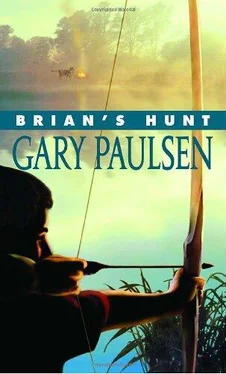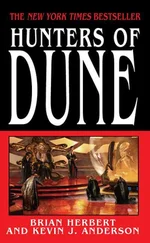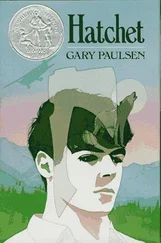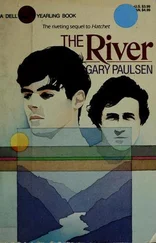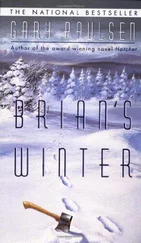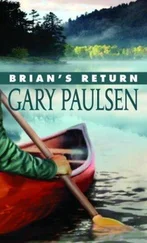But no, nothing. No sound, not even bugs, not even a loon.
And yet he was awake. Why? He trusted his instincts implicitly here in the bush and he knew there had to have been something, some big or little thing. The dream was not enough to wake him. There had to be some outside influence involved. But he could hear or see nothing. .
Wait. There.
A sound. What was it? Very soft, so that he could just barely hear it, and there again, soft, whimpering. .
A whine. A soft whimpering whine the way a dog might sound if it was begging or injured.
A dog?
Now he sat and scoured the bank but could see nothing. A coyote, perhaps, brush wolf as they called them up north, or maybe a timber wolf, two wolves, one begging from the other.
He had a small monocular in his pack. Binocu-lars were too heavy but there were times when he wanted to see things from a distance without disturbing them — he was especially interested in the eagle nests on many of the lakes because he wanted to see the young but didn’t want to get too close to them.
He took out the monocular and studied the lakeshore. It was only eight power, but it pulled in a lot of extra light from the moon and he broke the shoreline down into sections and tried to see the wolf or coyote. Or maybe it was a fox.
But there couldn’t be a dog out here, could there?
He saw nothing on the first sweep. He looked at the moon and was thinking it was probably two or three in the morning and perhaps he should just accept that it was a coyote or wolf or maybe even a small bear and get some more sleep when he heard it again.
Not louder, but somehow more persistent, perhaps a little longer in duration.
He started another sweep and was halfway through his swing, carefully studying the shoreline foot by foot, when he came to the area where he had made a fire and cooked the northern. And then he saw it.
By the log where he had lain back after eating there was a shape. Not moving, just sitting or hulking, not a coyote but certainly not as big as a wolf either.
A dark shape that might be a small bear — there were many bears in the bush, blacks, some of them cinnamon-colored blacks, and worthy of much respect. He had had a couple of run-ins, one with a bear that he had come close to shooting, another with a bear that had tried to move into his winter shelter and had been driven off by a skunk. But this didn’t look quite like a bear either.
Now it moved, stood slowly, and he saw that it had four legs, was slightly larger than a coyote, had a shiny patch on its shoulder, and unless he was completely insane was almost assuredly a dog.
Out here.
And looking at Brian across the water whining, whimpering.
Well, he thought. Just that. Well.
I might as well go see what it wants.
He sat up, completely awake now, and fetched the anchor line from the bow rope and pulled the little grapnel up and paddled toward shore.
Close on he stopped, forty feet from the bank, sixty from the dog, and studied it again. Rabies was a very real disease and while it usually killed the infected animals before they could go far or do much damage, he didn’t want to get torn up or killed if the dog was rabid.
He used the monocular again, even this close, because it gathered so much light, and scrutinized the animal. When he had paddled in the dog had come closer to the shore to meet him, but it moved poorly and seemed to favor its right side. Brian held the scope on it to see what was wrong.
It was most certainly a dog — he could see it was a female even in the dark — a nondescript kind of dark-haired malamute cross that the Crees sometimes had in their camps to pull sleds in the winter or pack in the summer. They were not so much sled dogs as just camp dogs and companions that pulled sleds when necessary. And this one seemed friendly enough, wanting to greet him. The dog had that shiny place on her shoulder but otherwise its coat was a dark brown.
And then she turned and Brian saw the shiny spot better and realized that the dog had been wounded in some way, perhaps in a fight, and there was a slash that started just at the top of her right shoulder and went down and back at an angle almost to her rear end. It had bled all down her side, and much of the blood had clotted, but in the moonlight Brian could see the shine of fresh blood.
“Oh man,” Brian said aloud, his voice almost startling him because he so rarely spoke, “what in god’s name happened to you?”
And the dog whimpered to him again in a sound that it seemed dogs reserved just for talking to humans, a soft asking sound, a soul sound, and Brian dug the paddle in and slipped up onshore to help.
When the dog saw the canoe move toward shore she at first moved to meet it, head down, tail wagging, but Brian hesitated just once more before touching the bank with the bow of the canoe.
This was all very strange, and strange things in the bush often deserved more study. The dog was here, she greeted Brian as a friend, but why? Why a dog? Why was it here? Was there more to it, more people here, something possibly not good waiting for him on the bank?
But he waited just a few seconds because when he was this close the dog first sat, whimpering with pain, and then lay down on her good side with the wound up and waited, just waited for Brian.
It was enough and he pushed up on the bank and jumped out of the canoe. He went to the dog and knelt next to her.
Of course it was still dark but there was the halfmoon and he saw that most of the wound, a foot-and-a-half-long rip down the side, was very superficial, just breaking and peeling back the skin, and it had clotted well. Here and there wet blood oozed but even as he watched, it seemed to diminish.
Still, it needed tending to and to do that he needed light, a fire.
“You stay here,” he told the dog. “I have to get wood and make a fire.”
Either because she understood or perhaps just that she was in pain, the dog stayed by the front of the canoe while Brian moved in the moonlight and found dead wood and dry grass and started a small fire nearby.
He took a burning stick and held it closer to see better and it frightened the dog. “Easy, easy, I have to see it. . ”
He put his hand on the dog’s head and she settled immediately, responding to the soothing sound of his voice. Brian held the light up again and in the relative brightness saw that the rip, however it had been caused, had torn back a flap of shoulder skin about half as big as his palm.
He could see exposed flesh, muscle. Although the meat was not too damaged he knew he would have to fix it in some way, cover it.
“Or sew it up,” he said aloud. “I have some fishing line and a needle. I wonder if you would let me sew the flap down?”
He went to the canoe and got out his sewing repair kit. He had thread there but thought it might be too light for the job, would pull out. The fishing line would work better except that he would have to use the large needle with it.
This, he thought, moving back to the dog, could go wrong in so many ways. She wasn’t a really large dog — perhaps forty pounds — but she had teeth and Brian had seen dogs fight in the city and had seen wolves kill deer and knew what those teeth could do. He’d read somewhere that the teeth at the back, the molars, even in a moderate dog could come down with twenty-six hundred pounds per square inch. The cross section of the bone in my arm, he thought, is about a square inch. Hmmmm.
Still, he couldn’t leave the wound that way.
“I have to hurt you,” he said to the dog, petting her head. “I’m sorry, but we have to sew that up. I’ll talk and tell you what I’m doing but if we don’t sew it and cover it the flies will plant eggs in it. . ”
Читать дальше
